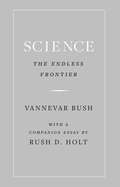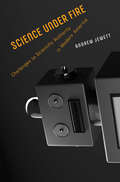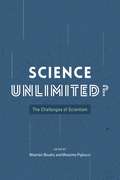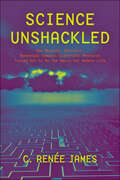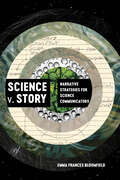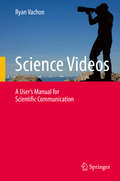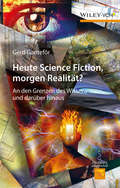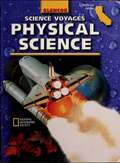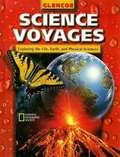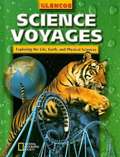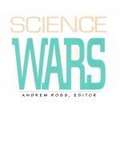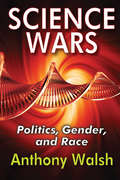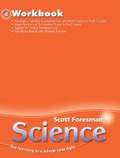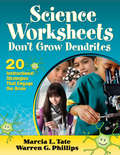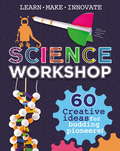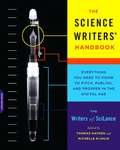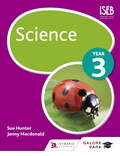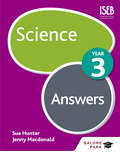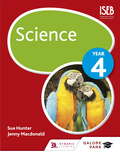- Table View
- List View
Science, the Endless Frontier: A Report To The President (Three Centuries Of Science In America Ser.)
by Vannevar BushThe classic case for why government must support science—with a new essay by physicist and former congressman Rush Holt on what democracy needs from science todayScience, the Endless Frontier is recognized as the landmark argument for the essential role of science in society and government’s responsibility to support scientific endeavors. First issued when Vannevar Bush was the director of the US Office of Scientific Research and Development during the Second World War, this classic remains vital in making the case that scientific progress is necessary to a nation’s health, security, and prosperity. Bush’s vision set the course for US science policy for more than half a century, building the world’s most productive scientific enterprise. Today, amid a changing funding landscape and challenges to science’s very credibility, Science, the Endless Frontier resonates as a powerful reminder that scientific progress and public well-being alike depend on the successful symbiosis between science and government.This timely new edition presents this iconic text alongside a new companion essay from scientist and former congressman Rush Holt, who offers a brief introduction and consideration of what society needs most from science now. Reflecting on the report’s legacy and relevance along with its limitations, Holt contends that the public’s ability to cope with today’s issues—such as public health, the changing climate and environment, and challenging technologies in modern society—requires a more capacious understanding of what science can contribute. Holt considers how scientists should think of their obligation to society and what the public should demand from science, and he calls for a renewed understanding of science’s value for democracy and society at large.A touchstone for concerned citizens, scientists, and policymakers, Science, the Endless Frontier endures as a passionate articulation of the power and potential of science.
Science under Fire: Challenges to Scientific Authority in Modern America
by Andrew JewettAmericans have long been suspicious of experts and elites. This new history explains why so many have believed that science has the power to corrupt American culture. Americans today are often skeptical of scientific authority. Many conservatives dismiss climate change and Darwinism as liberal fictions, arguing that “tenured radicals” have coopted the sciences and other disciplines. Some progressives, especially in the universities, worry that science’s celebration of objectivity and neutrality masks its attachment to Eurocentric and patriarchal values. As we grapple with the implications of climate change and revolutions in fields from biotechnology to robotics to computing, it is crucial to understand how scientific authority functions—and where it has run up against political and cultural barriers. Science under Fire reconstructs a century of battles over the cultural implications of science in the United States. Andrew Jewett reveals a persistent current of criticism which maintains that scientists have injected faulty social philosophies into the nation’s bloodstream under the cover of neutrality. This charge of corruption has taken many forms and appeared among critics with a wide range of social, political, and theological views, but common to all is the argument that an ideologically compromised science has produced an array of social ills. Jewett shows that this suspicion of science has been a major force in American politics and culture by tracking its development, varied expressions, and potent consequences since the 1920s. Looking at today’s battles over science, Jewett argues that citizens and leaders must steer a course between, on the one hand, the naïve image of science as a pristine, value-neutral form of knowledge, and, on the other, the assumption that scientists’ claims are merely ideologies masquerading as truths.
Science Unlimited?: The Challenges of Scientism
by Maarten Boudry Massimo PigliucciAll too often in contemporary discourse, we hear about science overstepping its proper limits—about its brazenness, arrogance, and intellectual imperialism. The problem, critics say, is scientism: the privileging of science over all other ways of knowing. Science, they warn, cannot do or explain everything, no matter what some enthusiasts believe. In Science Unlimited?, noted philosophers of science Maarten Boudry and Massimo Pigliucci gather a diverse group of scientists, science communicators, and philosophers of science to explore the limits of science and this alleged threat of scientism. In this wide-ranging collection, contributors ask whether the term scientism in fact (or in belief) captures an interesting and important intellectual stance, and whether it is something that should alarm us. Is scientism a well-developed position about the superiority of science over all other modes of human inquiry? Or is it more a form of excessive confidence, an uncritical attitude of glowing admiration? What, if any, are its dangers? Are fears that science will marginalize the humanities and eradicate the human subject—that it will explain away emotion, free will, consciousness, and the mystery of existence—justified? Does science need to be reined in before it drives out all other disciplines and ways of knowing? Both rigorous and balanced, Science Unlimited? interrogates our use of a term that is now all but ubiquitous in a wide variety of contexts and debates. Bringing together scientists and philosophers, both friends and foes of scientism, it is a conversation long overdue.
Science Unshackled: How Obscure, Abstract, Seemingly Useless Scientific Research Turned Out to Be the Basis for Modern Life
by C. Rene JamesAn “entertaining, informative, and thought-provoking” look at the world of pure science and how obscure research leads to major changes in our world (John M. Henshaw, University of Tulsa, author of A Tour of the Senses).With a novelistic style, C. Renée James reveals how obscure studies of natural phenomena—including curved space-time, poisonous cone snails, exploding black holes, and the precise chemical makeup of the sun—led unexpectedly to WiFi, GPS, genetic sequencing, pain medications, and cancer treatments. Science Unshackled brings both science and scientists to life and shows how simple curiosity can result in life-changing breakthroughs.Scientists engaged in what is known as basic research never know when exploring small questions will have big impacts. But, by following the scientific method, disciplined inquiry can lead to wondrous and practical discoveries that benefit all of us in the end. The next time someone asks you why “the government” wastes its money on weird research, recall the intriguing stories James has told and tell them the answer.
Science Unshackled: How Obscure, Abstract, Seemingly Useless Scientific Research Turned Out to Be the Basis for Modern Life
by C. Renée JamesFascinating stories that describe the unlikely path from quirky idea to useful and essential knowledge.Why in the world are we paying for all this "basic" research? The answer to this question becomes clear in this romp through the "seemingly useless" world of pure science, where one thing leads to another in ways that result in major scientific advancements. With a novelistic style, C. Renée James reveals how obscure studies of natural phenomena—including curved space-time, poisonous cone snails, exploding black holes, and the precise chemical makeup of the sun—led unexpectedly to WiFi, GPS, genetic sequencing, pain medications, and cancer treatments. Science Unshackled brings both science and scientists to life and shows how simple curiosity can result in life-changing breakthroughs.Scientists engaged in basic research, funded in large part by governments around the globe and throughout the centuries, never know when exploring small questions will have big impacts. But, by following the scientific method, disciplined inquiry can lead to wondrous and practical discoveries that benefit all of us in the end. The next time someone asks you why "the government" wastes its money on weird research, recall the intriguing stories James has told and tell them the answer.
Science v. Story: Narrative Strategies for Science Communicators
by Emma Frances BloomfieldUncovering common threads across types of science skepticism to show why these controversial narratives stick and how we can more effectively counter them through storytelling Science v. Story analyzes four scientific controversies—climate change, evolution, vaccination, and COVID-19—through the lens of storytelling. Instead of viewing stories as adversaries to scientific practices, Emma Frances Bloomfield demonstrates how storytelling is integral to science communication. Drawing from narrative theory and rhetorical studies, Science v. Story examines scientific stories and rival stories, including disingenuous rival stories that undermine scientific conclusions and productive rival stories that work to make science more inclusive. Science v. Story offers two tools to evaluate and build stories: narrative webs and narrative constellations. These visual mapping tools chart the features of a story (i.e., characters, action, sequence, scope, storyteller, and content) to locate opportunities for audience engagement. Bloomfield ultimately argues that we can strengthen science communication by incorporating storytelling in critical ways that are attentive to audience and context.
Science Videos: A User's Manual For Scientific Communication
by Ryan VachonEffective science communication is no easy task. While the effective conveyance of technical knowledge presents formidable roadblocks to sharing scientific knowledge and discoveries, certain communication tools like video and film production help to bridge this gap. This user’s manual provides a complete set of easy-to-follow directions for video-making as well as tricks of the trade to leverage these skills to better inform the intended audience.
Science Visions: Wieviel Science Fiction steckt in der Realitat?
by Gerd GanteförDie Visionen von heute können die Realität von morgen sein - die Naturwissenschaften werden auch in Zukunft die Grenzen der menschlichen Erkenntnis immer weiter hinausschieben!
Science Voyages: Exploring the Life, Earth, and Physical Sciences (Level Blue)
by Editors at the Glencoe/ McGraw-Hill CompaniesThe book explores a variety of topics from history of science to that of physical and life sciences with interesting experiments.
Science Voyages: Level Blue-CA.Edition
by GlencoeThe Science Voyages: Level Blue – California Edition (ISBN: 9780078239915) is an 8th-grade science textbook published by Glencoe/McGraw-Hill in 2001. Designed to align with California state science standards, this comprehensive resource covers Earth, life, and physical sciences. It integrates engaging visuals, hands-on activities, and clear explanations to foster a deeper understanding of scientific concepts.
Science Voyages: Volume 2 (California Edition)
by Mcgraw HillHow many plants and animals are discovered each year? You might think that the answer would be a small number, or perhaps none at all, but that would not be right. Life scientists discover, describe, and name hundreds of organisms every year. How do they decide if a certain plant belongs to the iris or orchid family of flowering plants? Or, if an insect is more like a grasshopper or a beetle? Think about how scientists might make these distinctions. The science of classifying is called taxonomy (tak SAHN uh mee). Classification is an important part of your life.<P> This text starts with Chapter 21.
Science Voyages: Exploring the Life, Earth, and Physcial Sciences (Level Red)
by Glencoe Mcgraw-HillScience textbook for high school students.
Science Voyages: Level Green (California Edition)
by Mcgraw-Hill StaffScience Life Voyages covers: interactions in the living world, the human body, ecology and life's diversity.
Science Voyages, Level Green: Exploring the Life, Earth, and Physical Sciences
by Glencoe Mcgraw-HillScience Wars
by Andrew RossIn the wake of the highly fractious Culture Wars, conservatives in science have launched a backlash against feminist, multiculturalist, and social critics in science studies. Paul Gross and Norman Levitt's book Higher Superstition, presented as a wake-up call to scientists unaware of the dangers posed by the "science-bashers," set the shrill tone of this reaction and led to the appearance of a growing number of scare stories about an "antiscience" movement in the op-ed sections of newspapers across the country. Unwilling to be political scapegoats for the decline in the public funding of science and the erosion of the public authority of scientists, many of these critics--natural scientists, sociologists, anthropologists, historians, and scholars in cultural studies and literary studies--have taken the opportunity to respond to the backlash in Science Wars.At a time when scientific knowledge is systematically whisked out of the domain of education and converted into private capital, the essays in this volume are sharply critical of the conservative defense of a value-free science. They suggest that in a world steeped in nuclear, biogenic, and chemical overdevelopment, those who are skeptical of technology are more than entitled to ask for evidence of rationality in those versions of scientific progress that respond only to the managerial needs of state, corporate, and military elites. Whether uncovering the gender-laden assumptions built into the Western scientific method, redefining the scientific claim to objectivity, showing the relationship between science's empirical worldview and that of mercantile capitalism, or showing how the powerful language of science exercises its daily cultural authority in our society, the essays in Science Wars announce their own powerful message. Analyzing the antidemocratic tendencies within science and its institutions, they insist on a more accountable relationship between scientists and the communities and environments affected by their research.Revised and expanded from a recent issue of Social Text, Science Wars will provoke thought and controversy among scholars and general readers interested in science studies and current cultural politics.Contributors. Stanley Aronowitz, Sarah Franklin, Steve Fuller, Sandra Harding, Roger Hart, N. Katherine Hayles, Ruth Hubbard, Joel Kovel, Les Levidow, George Levine, Richard Levins, Richard C. Lewontin, Michael Lynch, Emily Martin, Dorothy Nelkin, Hilary Rose, Andrew Ross, Sharon Traweek, Langdon Winner
Science Wars: Politics, Gender, and Race
by Anthony WalshFew issues cause academics to disagree more than gender and race, especially when topics are addressed in terms of biological differences. To conduct research in these areas or comment favorably on research can subject one to scorn.When these topics are addressed, they generally take the form of philosophical debates. Anthony Walsh focuses upon such debates and supporting research. He divides parties into biologists and social constructionists, arguing that biologists remain focused on laboratory work, while constructionists are acutely aware of the impact of biologists in contested territories.Science Wars introduces the ideas motivating the parties and examines social constructionism and its issues with science. He explores arguments over conceptual tools scientists love and constructionists abhor, and he provides a solid discussion of the co-evolution of genes and culture. Walsh then focuses his attention on gender, how constructionists view it, and the neuroscience explanation of gender differences. Moving to race, Walsh looks at how some have tried to bury the concept of race, while others emphasize it. He considers definitions of race—essentialist, taxonomic, population, and lineage—as they have evolved from the time of the Enlightenment to the present. And finally, he attempts to bring the opposing sides together by pointing out what each can bring to a meaningful discussion.
Science Without Laws: Model Systems, Cases, Exemplary Narratives
by Angela N. H. Creager Elizabeth Lunbeck M. Norton WisePhysicists regularly invoke universal laws, such as those of motion and electromagnetism, to explain events. Biological and medical scientists have no such laws. How then do they acquire a reliable body of knowledge about biological organisms and human disease? One way is by repeatedly returning to, manipulating, observing, interpreting, and reinterpreting certain subjects--such as flies, mice, worms, or microbes--or, as they are known in biology, "model systems. " Across the natural and social sciences, other disciplinary fields have developed canonical examples that have played a role comparable to that of biology's model systems, serving not only as points of reference and illustrations of general principles or values but also as sites of continued investigation and reinterpretation. The essays in this collection assess the scope and function of model objects in domains as diverse as biology, geology, and history, attending to differences between fields as well as to epistemological commonalities. Contributors examine the role of the fruit fly Drosophila and nematode worms in biology, troops of baboons in primatology, box and digital simulations of the movement of the earth's crust in geology, and meteorological models in climatology. They analyze the intensive study of the prisoner's dilemma in game theory, ritual in anthropology, the individual case in psychoanalytic research, and Athenian democracy in political theory. The contributors illuminate the processes through which particular organisms, cases, materials, or narratives become foundational to their fields, and they examine how these foundational exemplars--from the fruit fly to Freud's Dora--shape the knowledge produced within their disciplines. Contributors Rachel A. Ankeny Angela N. H. Creager Amy Dahan Dalmedico John Forrester Clifford Geertz Carlo Ginzburg E. Jane Albert Hubbard Elizabeth Lunbeck Mary S. Morgan Josiah Ober Naomi Oreskes Susan Sperling Marcel Weber M. Norton Wise
Science Workbook: Grade 5
by Scott ForesmanThis Grade 5 workbook covers life science, earth science and physical science.
Science Worksheets Don't Grow Dendrites: 20 Instructional Strategies That Engage the Brain
by Marcia L. Tate Warren G. PhillipsA brain-friendly guide for motivating students to live, eat, and breathe science! The authors outline 20 proven brain-compatible strategies, rationales from experts to support their effectiveness, and more than 250 activities for incorporating them. Teachers will find concrete ways to engage students in science with visual, auditory, kinesthetic, and tactile experiences that maximize retention, including: Music, rhythm, rhyme, and rap Storytelling and humor Graphic organizers, semantic maps, and word webs Manipulatives, experiments, labs, and models Internet projects
Science Workshop: 60 Creative Ideas for Budding Pioneers
by Anna ClaybourneLearn, make and innovate with this bumper book packed with sixty projects. Science Workshop is the go-to guide for creative and unique experiments. With chapters on art, food, nature, pure science and technology, this book will have a great 'make' for you. Step-by-step instructions can help you:-Take to the skies with a plane inspired by the Wright brothers-Light up the world with a neon sign influenced by artist Tracy Emin-Construct a stunt ramp to get to grips with forces like Galileo Galilei-And much, much more! All the projects in Science Workshop are prompted by featured profiles of great scientists, artists and engineers. Learn about and create the experiments and builds that have led to world-changing discoveries, amazing machines and inspiring artworks. Perfect for KS2 science and technology classes aged 9 and up.
The Science Writers' Handbook: Everything You Need to Know to Pitch, Publish, and Prosper in the Digital Age
by Thomas Hayden Michelle NijhuisPopular science writing has exploded in the past decade, both in print and online. Who better to guide writers striving to succeed in the profession than a group of award-winning independent journalists with a combined total of 225 years of experience? <P><P>From Thomas Hayden’s chapter on the perfect pitch to Emma Maris’s advice on book proposals to Mark Schrope’s essential information on contracts, the members of SciLance give writers of all experience levels the practical information they need to succeed, as either a staffer or a freelancer. Going beyond craft, The Science Writer’s Handbook also tackles issues such as creating productive office space, balancing work and family, and finding lasting career satisfaction. It is the ultimate guide for anyone looking to prosper as a science writer in the new era of publishing.
Science Year 3
by Sue Hunter Jenny MacdonaldScience Year 3 goes beyond the requirements of the new National Curriculum and builds an excellent foundation for scientificunderstanding, exploring the study of our bodies, vertebrates and invertebrates, light and shadow, materials, rocks and dinosaurs. Together with Science Year 4, this book is ideal to underpin a course of study leading to Common Entrance and other independent school entrance exams at 11+- Endorsed by ISEB- Packed with challenging exercises and practical activities to stimulate and enthuse young scientists- 'Did you know?' boxes encourage an active interest in science and the world around us- Rigorous extension questions will stretch and challenge the most able
Science Year 3 Answers
by Sue Hunter Jenny Macdonald- Clear layout saves time marking work - Enables efficient assessment of pupils' strengths and weaknesses - Includes diagrams and working where necessary, to demonstrate how to present answers
Science Year 4
by Sue Hunter Jenny MacdonaldScience Year 4 covers all relevant topics including habitats, plants, solids, liquids and gases, electrical circuits and friction. Rigorous exercises and scientific activities throughout are certain to challenge and engage young scientists. Together with Science Year 3, this book is ideal to underpin a course of study leading to Common Entrance and other independent school entrance exams at 11+.- Endorsed by ISEB- Packed with challenging exercises and practical activities to stimulate and enthuse young scientists- 'Did you know?' boxes encourage an active interest in science and the world around us- Rigorous extension questions will stretch and challenge the most able
